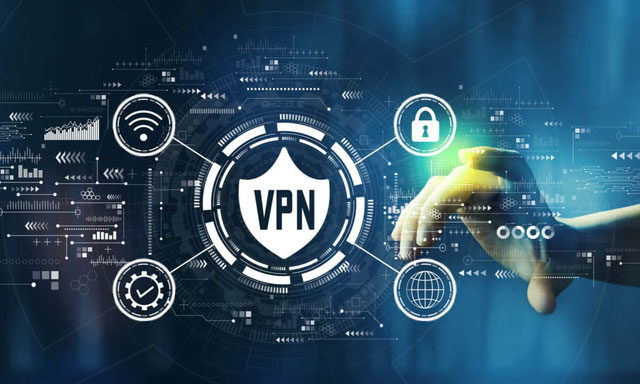Myths and truths surrounding free VPNs
Some people believe that VPNs are only used for illegal purposes, while others believe that free VPNs are not trustworthy.
History of VPNs
The first phase of VPN history dates back to the 1970s. In those days, private network lines were used to discreetly connect to network devices. And the development of modern VPN is associated with Microsoft when an employee of this company developed the first "Point-to-Point Tunneling Protocol (PPTP)" in 1996. That point, VPNs are used in the corporate world as a way to transmit data securely. VPN technology became popular in the 2000s.
VPNs today are used to secure internet connections, protect against viruses and hacks, ensure online privacy, open geo-blocked content, and hide users' physical locations. Considered an important tool for maintaining safety and security online, VPNs are now more affordable and easier to use than ever.

VPNs are used today to protect internet connections, protect against viruses and hacks.
Technological advancements have brought us free VPNs. Free VPNs typically offer the same level of encryption and use the same protocols as premium options. Typically, the free VPN version is used as a way to attract new customers, some of whom will eventually purchase a premium subscription or recommend it to their friends. While there are certain limitations compared to premium options, such as having fewer accessible VPN servers, free VPNs still provide excellent data security.
Myths and truths about free VPNs
Myth 1: Only hackers and criminals use VPNs
Today, VPNs are used as a technology to protect against criminals and hackers. Statistics show that 65% of VPN users use it for work and security, the rest for gaming and accessing many websites for various entertainment purposes.
VPNs provide security by encrypting traffic. This makes it harder for hackers to access your data because they not only need to get your data, but they also need to decrypt it.
Even if you have nothing to hide, privacy is still valuable. Digital tracking is a lucrative industry, and even seemingly innocuous data can be exploited to create a comprehensive portrait of you. All information collected by advertisers and data brokers is available for use or can be sold to the highest bidder.
Myth 2: VPNs are only for tech-savvy people; they are too complicated for the average user
Modern VPNs have user-friendly interfaces, so you don't need to be a networking expert to use them.
The process of using a VPN is quite simple in most cases. Using a Chrome extension or a VPN app on your phone, you can quickly establish a VPN connection with just a few clicks or taps on your phone screen.
Myth 3: Free VPNs sell user data
As mentioned above, free VPNs are often offered by providers that also have a paid option and use this as a way to attract new customers. Selling user data here would be counterproductive as the potential damage to one's reputation would outweigh any immediate financial gain. With fierce competition in the VPN industry, reputation is very important. Therefore, a "wise" business will not accept that risk.
Take a close look at a VPN company's privacy and security policies to see how they handle customer data. It's true that some VPN companies on the market handle user data less carefully than others, but there are also VPN companies that have a reputation for adhering to strict privacy guidelines.

There are now free VPN solutions for almost all devices.
It is also essential to check the VPN provider's country of registration. The country's regulations will significantly affect that company's ability to process user data.
Myth 4: Free VPNs have compatibility issues
Many websites use various methods to hinder VPN traffic. Since unencrypted and anonymized traffic contains more user data that can be inspected and used for personal gain, they take these actions to protect their interests.
In terms of compatibility with different devices, there are now free VPN solutions for almost all devices. So you can install free VPN on iOS, download browser extension, set VPN on Windows, etc.
Myth 5: Free VPNs are usually slow
In reality, speed depends on many factors, including the current load on the VPN server, distance to the remote server, and VPN protocol. In both paid and free VPNs, there can be situations where the load on a server is too high, causing work to slow down. This can usually be fixed by selecting a different server within the application. Normally, the average user will not notice a change in speed, but this can be very important for those choosing a VPN for gaming.
- Odd myths in science
- 11 'crazy' facts in the world that make sure 90% of us have never heard of
- 4 wonders intersecting between myths and real life: Imagine fiction that is 100% real
- Top 3 best free messaging applications in Vietnam
- 10 misconceptions that you often mistake when exercising
- Angels in myths never fly?
The 'people who give way to the soul' in myths
- Mysterious science behind the direct free kick
- Pollination crisis: myths?
- 7 horrible truths about cyanide - poison that is covering Tianjin
- 5 best free antivirus software 2016
- Free software not to be missed
 What is the Snapdragon SiP chip?
What is the Snapdragon SiP chip? How to create a yellow circle around the mouse cursor on Windows
How to create a yellow circle around the mouse cursor on Windows Edit the Boot.ini file in Windows XP
Edit the Boot.ini file in Windows XP 3 ways to restart the remote computer via the Internet
3 ways to restart the remote computer via the Internet